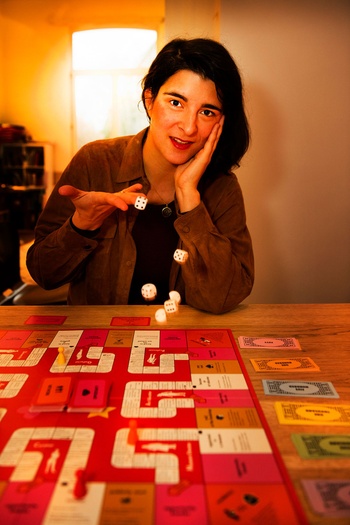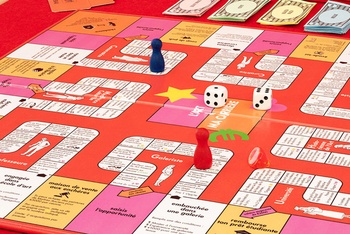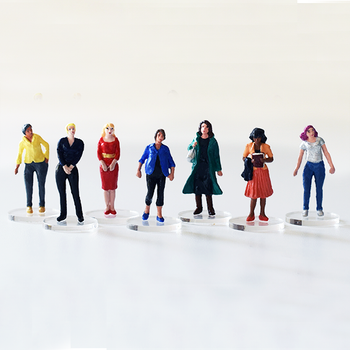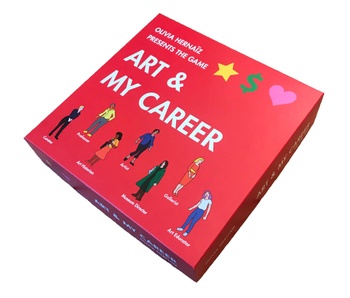An old-fashioned board game, a contemporary work of art, and a major awareness update, Olivia Hernaïz’s Art & My Career gives you the chance to walk a mile in the uncomfortably high-heeled shoes of women trying to make it in the art world. Well, don’t mind if I do. The game is on! “I have no opportunities, barely any cash, I’m not very happy and I’m just a bit famous. My life sucks.”
WHO IS OLIVIA HERNAÏZ?
Born in Brussels in 1985
Starts creating art as a child, but goes on to study law in Brussels, Louvain-la-Neuve, and Buenos Aires
While practicing as a lawyer, she completes a Bachelor of Fine Arts at La Cambre, and starts using her grandmother’s name
In 2015, she puts out the bookDessine-moi ton pays with her sister, and builds a school in North Kivu with the proceeds
In 2016, she obtains a Master of Fine Arts at Goldsmiths
In 2017, she wins the first prize of Art Contest and has her first solo show at the Musée d’Ixelles
In 2020, her board game Art & My Career is released and played in art centres around Europe
In 2021, a solo show at Mu.ZEE will focus on the life of her grand- mother, who, as a fourteen-year- old was evacuated to Russia to escape the Spanish Civil War
“You know, I must have played this game about thirty times and I've won only once. Maybe I'm just too focused on explaining the rules and mediating the game, or maybe I'm just very bad at playing. (Laughs) I've always liked to play games, but I lack the competitive edge, the will to win. I'm happy simply spending some time together.” Olivia Hernaïz is doing her best at reassuring me as we set up our boards – each of us in front of our own computer screen – as I mention my anxiousness of playing a game with the person who created it. Sure, she might know all the ins and outs of Art & My Career, but then again, you still need to roll the dice. “As in life, exactly. Strategy plays a major part in the game, but there is a lot of chance involved as well. Who do you meet? When do you meet them? Were you born into a wealthy, influential family? And so on. You don't have full control over the game. I might know which square is where, but that doesn't mean I'm going to end up on them.”
Art & My Career isn't a game out to generate sore losers or graceful winners – at least not primarily. Brussels-born visual artist Olivia Hernaïz developed the game over a period of two years, after discovering James Cooke Brown's board game Careers during a residency in Spain. “We used to play that original 1950s version a lot. Though it was quite outdated and slightly sexist, you could see James Cooke Brown really wanted to find a balance between money and other values like fame, happiness, virtue, power and enlightenment. I doubt, looking at his writing and vision, that the game was entirely to his liking.”

© Ivan Put
| Olivia Hernaïz rolls the dice: “I would love for Art & My Career to be obsolete in five years.”
“Those days I used to film sessions of my friends playing the game, asking them to do so while wearing black suits, or in a field. So I was already adapting the game because I felt that there was something missing, that there was something I could deepen. When I discovered that there was also a Careers for Girls, made in the 1980s and which was super sexist, I knew that I needed to go further and really appropriate the game. So I started asking women working in the art scenes in France, Belgium, and the United Kingdom if they would like to answer a few questions. That anonymous and confidential survey evolved from one to two to almost ten pages – with questions ranging from financial stability, competition and solidarity, sexism and sexual harassment to relationships, opportunities, motherhood and so on. I received about one hundred replies and that's when I knew this game simply had to exist.”
This game is an excuse to start a conversation, to re-introduce the forum, to resurrect public space through public speech
Enter Olivia Hernaïz's stunningly designed yet highly unsettling Art & My Career, featuring seven female characters – an art historian, a gallerist, a professor, an art educator, a museum director, a curator, and an artist – who each try to make it in the art world by collecting money, happiness and/or fame. “You know, I could have made this game all by myself and have invented nearly exactly the same experiences, because nothing in the game is very surprising. But these women's generosity, their trust really filled me with a sense of responsibility, legitimacy, entitlement. That's the main reason for this larger scale, for a game that is affordable and available: I want it to be publicly played and shared, experienced and discussed.”
BABY BUMP
So we get on with it. After picking a token, rolling the dice to determine our starting salaries – Olivia Hernaïz is awarded $2,000, I get $3,000 –, and choosing a winning formula by splitting 60 units over an amount of money to be aspired to, hearts (for happiness), and stars (for fame), I take off – “Because, well, men first,” Olivia Hernaïz says laughingly.
I quickly learn a few things. The career path of an artist doesn't allow you to pass by Pay Day – “Guess why?” –, you can't go into the red – “That was way too depressing!” –, Opportunity cards offer quick and sometimes privileged routes to careers, Network cards allow you to move a certain number of steps without having to depend on the dice, and I should certainly not try my luck. While Olivia Hernaïz enters University in the pursuit of a degree in art history, and receives three hearts for being part of a collective exhibition of students and two Opportunity cards because her gallerist uncle attends her graduation show, I end up in Hospital, where I am laid up until I throw five or less, or pay half of my salary in cash for “special treatment”. I throw eleven and pay up. “And my salary increases by $2,000,” Olivia Hernaïz says upon graduating, “but I end up on the 'Pay back your student loan' square, so I also lose a quarter of my cash.”

Olivia Hernaïz: “Art & My Career is a role-playing game, it’s an excuse, like other works that I have made, to start a conversation, to re-introduce the ancient forum as a space where civil society meets and discusses subjects of the city.”
I have a bit of luck when I get the opportunity to become an artist. A job as a gallery technician helps me to meet the right people, and all my expenses are paid. I throw two, and “succeed in hiding [my] baby bump from [my] gallerist.” I get a show, six stars, and four hearts. “I kind of mixed two testimonies here,” Olivia Hernaïz explains. “One from a friend of mine, a painter, who was expecting her second baby and didn't feel comfortable telling her gallerist, as she was planning a show. And then there was another testimony of an artist who actually told her gallerist that she was pregnant and he answered that there was still time to abort. It's about how an artist, once he or she is on the market, is faced with the pressure to produce and about how some gallerists' attitudes are quite…well, intense. When you're represented by a gallery, you have a show every two years or so. They have invested so much, that having a baby, and not producing for a year or so, is difficult. Artists – not just women, men just as well – barely get paid to think about their work, they have to make it. Taking some time to reflect on your practice isn't part of the business plan.”
“In the game, the artist's career is very much linked to pregnancy and maternity, because it is the ultimate example of precarity, of how people would choose not to have kids because their financial situation is too unstable and they know they won't be able to combine the two. But it's also things like working as an artist couple, and noticing that your partner is asked about the work while you're faced with questions about the kids.”
“I have learned and realised a lot when making this game,” Olivia Hernaïz explains. “It's a period in my life where I acknowledged that I am actually not an artist, I am a female artist. It's not the same thing. I realised that prior to this project, I had been trying to make art as an artist, a male artist, and that I was erasing my identity as a woman. So this feels a bit like a coming out.”
DOWN-AND-OUT
While Olivia Hernaïz's attempt to become an art educator is nipped in the bud when her zero-hour contract is not renewed and she ends up unemployed and down-and-out, I go viral on Bullshitgram, sell my work to the Giggounheim Foundation, and win “The Tiger of Trevise” – and the accompanying stars and hearts, which I then lose quicker than quick when my ex-partner sues me in court claiming that I stole all their ideas. “Yeah, I know. He must have been really jealous of you,” Olivia Hernaïz teases, after entering the art historian's career path and becoming the token POC speaker at the symposium “Art and Feminism” – “Score four stars, lose two hearts.”

Olivia Hernaïz’s board game Art & My Career features seven female characters – an art historian, a gallerist, a professor, an art educator, a museum director, a curator and an artist – who each try to make it in the art world by collecting money, happiness and/ or fame
Instability is key. Female teachers at art schools are often guest tutors, putting them in an awkward position without much voice or security. The same goes for a lot of artists who succeed in joining a gallery but are not backed up by contracts. When one of my drawings is chosen for the flyer of the grad show, I receive six stars, but – as Olivia Hernaïz points out – there is no money exchanging hands.
I wonder if there is anyone really trying to win this game? “Absolutely,” Olivia Hernaïz says. “I noticed that there are three phases players go through. First they discover the rules, then they discover and discuss the content, and eventually the game takes over, people get really competitive and they kind of forget about the content. That's why I often tell people to have a mediator when playing the game, someone who can refocus on the content and stimulate a debate.”
Some debates push themselves along. To become a gallerist, Olivia Hernaïz needs to meet the standard requirements and buy herself a new outfit. Three steps into the career path, the director finds her very attractive and she is promoted to the front desk and receives a salary increase of $1,000. But when she refuses a candlelight dinner with a collector, she gets fired. “Down-and-out again…pfff. I have no opportunities, barely any cash, I'm not very happy, and I'm only a bit famous. My life sucks. Well, you know why: I have principles. I didn't want to sell my body to keep my job,” she laughs emotionally.
It’s really hard sometimes to be a woman in the art world. There have been times I even surprised myself with how emotional I was, where I was just crying in front of my computer, thinking: “Oh my God, that really happened to her? How can you go on after that?”
“Most of the testimonies in this category come from friends who are working for big, Gagosian-like gallery structures in London, so women who work jobs without much responsibility and need to kind of fight their way up. But there are also stories of artists that uncover innuendo and sexual harassment. Friends that said that they weren't sure if collectors bought their work because of the work or because of them, or collectors asking a gallerist to send the artist herself to bring the work to their house. It's really hard sometimes to be a woman in the art world. There have been times I even surprised myself with how emotional I was, where I was just crying in front of my computer, thinking: 'Oh my God, that really happened to her? How can you go on after that?' The hundred people filling out my survey have really put their trust in me by sharing their life experiences. Realising that gives me the energy to try and share this game as much as I can, because I think it is really useful for young artists and students to understand that they will face certain situations, and that they are not alone. You know, I have been more or less lucky as a woman and an artist, maybe because I started art school after having studied law having already lost some of my naivety.”
DR. JEKYLL AND MRS. HYDE
As we, between ourselves, strike deals, share profits, buy happiness, visit artists' studios (six hearts), find original works by Denise Jourbois (six stars, three hearts), push out another curator as she was stepping on our toes (two Network cards), win the Prata Foundation Prize ($20,000), and lose ethics because our exhibition “Shapes” only contains straight white men, Olivia Hernaïz explains how her interest in law does not stop her from pursuing her career as an artist but in fact helps her. “My artistic work also reflects my interests in matters of justice, the organisation of society, the myth of our legal system, and so on. Although it is difficult, because the impact I have as an artist is more subtle, interaction with the public is rare and ephemeral, and I can sometimes feel isolated within my own ideas, as an artist I also want to be a social actor. I feel like we, on the continent, always see too great a divide between the two. That's why I loved studying at Goldsmiths in England: there you can take on music for three years and then study law in your master. That actually freed me, made me see that I can be many different people at once. We don't fit into boxes, we have complex personalities.”

That's the reason why there is Olivia, the copyright lawyer, and Olivia Hernaïz, the visual artist who borrowed her name from her Spanish grandmother who, like many other children, was evacuated to Russia to escape the Civil War when she was only fourteen. “Using her name has made me feel even freer, though when I was still a practicing lawyer, I sometimes felt like Dr. Jekyll and Mr. Hyde: I was pleading all day while also studying at La Cambre, and going out to paint the façades of buildings destined to be demolished during lunch hours. That was Olivia Hernaïz's little secret, the thing that gave me the energy to keep going on and earn enough to get into Goldsmiths for my master in fine arts. Being a lawyer can be really passionate, but when you're already in love with art, everything else can look so boring.”
Olivia Hernaïz's art unfolds like a playing field, a space for dialogue and exchange of experiences and knowledge. A mosaic, like Art & My Career, where roles and responsibilities are exposed, a conscience is awoken, and eventually – hopefully – the struggle is averted. “I would love for Art & My Career to be obsolete in five years. Maybe the format can serve as a blueprint for other people to fill out, change, adapt to fit their life stories, their testimonies about social injustices, ecology and so on. I'm already thinking about organising workshops at art centres and schools to have people imagine different situations. That's what this game is about: it's like a role-playing game, it's an excuse, like other works that I have made, to start a conversation, to re-introduce the forum – to go back to my legal background. The forum is a space where civil society meets and discusses issues of the city and where everyone is entitled to engage in that conversation. I think we have lost that sort of public space – by sitting on benches, next to each other, checking our phones and not talking to one another – and I'm trying to resurrect it through public speech.”
I’m mediating many different voices, and that makes it feel real and makes it feel right. Sure, that’s idealistic, but if I’m not idealistic in my artistic projects, I become cynical. And in this project specifically I want to be hopeful...
“When the game is played at a public art centre, where everyone can join in, for me that's rebuilding public space, by having different types of people from different generations, with different genders, sharing and confronting their opinions, thoughts, and experiences. Perhaps not being forced to share those experiences if they are hurtful, but being able to talk about them through the examples of other people. That's definitely what makes this project strong: it's not my voice, I'm just mediating many different voices, and that makes it feel real and makes it feel right. Sure, that's idealistic, but if I'm not idealistic in my artistic projects, I become cynical. And in this project specifically I want to be hopeful…”
“Oh, wait, did you win?” Olivia Hernaïz asks, when I pay inheritance tax for my parents' house in the countryside and get a final overdose of happiness in return. “Well done, you! But I still let you win.” (Laughs)
OLIVIA HERNAÏZ: ART & MY CAREER
GAME: €50, www.oliviahernaiz.com/career
PUBLIC SESSION: 28/1, 18.00, Iselp, iselp.be
ART CARES COVID: INSIDE-OUT (group show)
> 14/2, Royal Museums of Fine Arts, www.fine-arts-museum.be
Read more about: Expo , Olivia Hernaïz , Art & My Career
Fijn dat je wil reageren. Wie reageert, gaat akkoord met onze huisregels. Hoe reageren via Disqus? Een woordje uitleg.